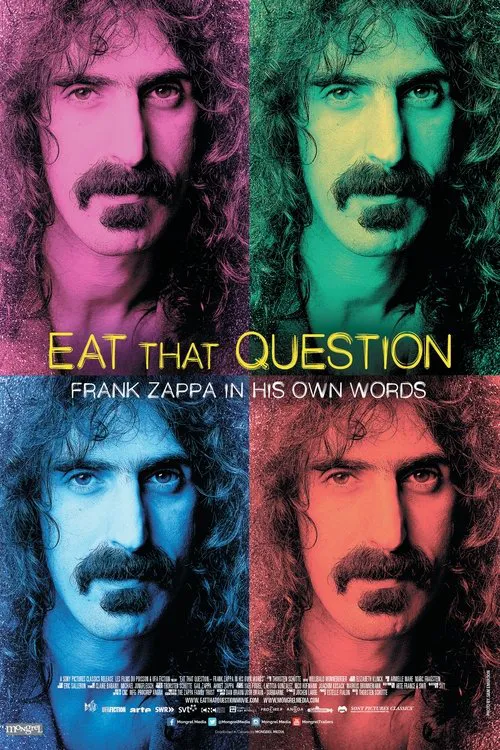Eat That Question: Frank Zappa in His Own Words

Trama
Frank Zappa's complex and multifaceted personality is skillfully woven throughout the documentary "Eat That Question: Frank Zappa in His Own Words." The film, utilizing a multitude of television interviews and an assortment of forgotten performances, offers an intimate glimpse into the inner workings of the late musician's mind. It is an unvarnished portrayal, stripped of the veneer of commercial considerations, showcasing two contrasting aspects of Zappa's character: the charismatic composer who found profound joy in his work and the incisive philosopher who never wavered in the face of adversity. At the core of the documentary are Zappa's television interviews, which often found him at the center of heated debates regarding his music, the excesses of 1970s counterculture, and the perils of censorship. These exchanges not only serve as a platform for Zappa's unapologetic views but also function as a reflection of his evolving perspective over the course of his career. The film masterfully juxtaposes footage of Zappa engaging in these high-intensity discussions with clips from his musical performances, providing a poignant reminder of the artistic brilliance that underpinned his uncompromising stance. Throughout the documentary, Zappa's artistic range is showcased in a series of performances that span nearly three decades. These appearances reveal a dynamic and unpredictable performer who effortlessly traversed an impressive array of musical styles, from the avant-garde experimentation of his early work to the polished, hook-laden songcraft of his later years. These performances, which range from his collaborations with orchestras and classical ensembles to his explosive live sets with the Mothers of Invention, demonstrate Zappa's unwavering commitment to pushing the boundaries of what was deemed acceptable in popular music. It is, however, in his interviews that Zappa's character truly comes alive. His opinions on everything from the banality of television to the perils of censorship are delivered with a precision that is both captivating and unnerving. Zappa's critiques of the music industry, which he felt had stifled his creativity and forced artists to compromise their artistic vision, are particularly biting. These observations, which were often delivered in the face of significant adversity, highlight Zappa's unwavering commitment to artistic integrity and his determination to resist the pressures that sought to dilute his work. As the documentary progresses, it becomes clear that Zappa's character was defined by an ongoing dialectic between opposing forces. On one hand, he was a charismatic performer who reveled in the freedom to express himself through music. On the other, he was a fiercely intelligent critical thinker who, despite facing countless challenges, remained resolute in his convictions. This dichotomy is perhaps best captured in a sequence of interviews in which Zappa discusses his views on censorship and the role of the artist in a free society. In these exchanges, Zappa's words are punctuated by flashes of wit and humor, as well as moments of profound introspection. He engages in a spirited debate with a television host regarding the role of government in regulating artistic expression, dismissing the notion that the government has a responsibility to protect citizens from what he sees as "indecent" content. This stance, which was a hallmark of Zappa's persona, was frequently misunderstood by those who saw him as insensitive or, worse still, as an enfant terrible of popular music. Zappa's interviews are also marked by an undercurrent of frustration, a sense that he was being pulled in multiple directions by competing forces. As the music industry continued to expand its reach and commercial ambitions accelerated, Zappa found himself increasingly alienated from the very audience he had once sought to please. The pressures to compromise his artistic vision and to conform to expectations grew accordingly, leading to a series of escalating conflicts that left Zappa feeling beleaguered and misunderstood. Throughout the documentary, the viewer is struck by the sense that Zappa's character was always in flux, a dynamic being who was constantly adapting to the changing world around him. His interviews and performances serve as a kind of ongoing monologue, a series of vignettes that offer a glimpse into the inner workings of a complex and multifaceted mind. Ultimately, "Eat That Question" is a testament to Frank Zappa's unwavering commitment to artistic expression and his unshakeable determination to resist the pressures of the outside world. It is an unflinching portrayal of his life and career, one that strips away the veneer of commercial success to reveal the true character of a remarkable artist.
Recensioni
Raccomandazioni



